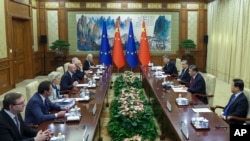European Union leaders urged China on Thursday to fix the country’s trade imbalance with Europe and press Russia for an end to the war in Ukraine.
In the first-in person talks in more than four years between the heads of China and the European Union, President Xi Jinping and Premier Li Qiang met in Beijing with Charles Michel, the president of the European Council, and Ursula von der Leyen, the president of the European Commission.
War in Ukraine
In her opening speech, von der Leyen squared off with Xi on Beijing’s close ties to the Kremlin, saying that China could do more “to put an end to the Russian aggression against Ukraine.”
As Russia’s top trade partner, China has helped Putin circumvent Western sanctions meant to punish his economy. Von der Leyen and Michel pressed Xi and Li about that lucrative relationship.
China’s support of Russia’s invasion of Ukraine has added to already tense ties between Beijing and the West. Since the war broke out, Beijing has purchased more Russian oil than any other nation, according to Chinese customs data. China also has reportedly sent drones and other cutting-edge equipment to Putin’s military.
Xi has long denied that he is partial to the Kremlin. But to European officials, his silence on alleged Russian war crimes speaks louder than words.
During the meeting on Thursday, European leaders made clear that they want China to leverage its economic influence over Russia to call for a cease-fire.
Speaking to the press after the summit, von der Leyen said, “We have been clear since the beginning of the war that how China will position itself vis-à-vis the Russian aggression toward Ukraine, this will define also our relationship.”
Trade deficit
Last year, the EU recorded a $426 billion trade deficit with China, more than any year before.
Thursday’s talks exposed a widening rift on trade in particular between Xi’s Chinese Communist Party and Europe just days after Italy decided to drop out of the Belt and Road Initiative, China’s sprawling international network of trade agreements and infrastructure projects.
Italian Prime Minister Giorgia Meloni, who rose to power last year, had long been critical of her country’s involvement in the Belt and Road Initiative.
The European Union has positioned itself side-by-side with the U.S., even officially calling China a “strategic rival.”
Xi told European leaders that bolstering “political mutual trust” means “eliminating all kinds of interference,” an apparent reference to Washington.
In September, the European Union launched an investigation into whether electric car manufacturers in China have taken government subsidies to compensate for losses, an anticompetitive practice. If guilty, electric cars imported to Europe from China could be tariffed. That investigation has drawn scorn from Chinese officials.
How much competition the European Union should allow with China in the electric car market is a particularly sensitive question.
Xi said that both China and the European Union must develop “a right perception” of each other and aim for understanding.
China’s Premier Li Qiang called for the European Union to “be prudent when introducing restrictive economic and trade policies and when using measures to keep its trade and investment markets open.”
One point of progress, Von der Leyen said, was that China agreed to establish clearer guidelines on how and when European firms can transfer data out of the country. China’s stringent and at times unclear restrictions on cross-border information systems have impacted Europe’s ability to do business there.
Some information for this report came from The Associated Press, Agence France-Presse and Reuters.





